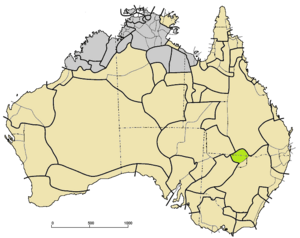Muruwari language facts for kids
Quick facts for kids Muruwari |
|
|---|---|
| Region | Queensland and New South Wales, Australia |
| Ethnicity | Muruwari |
| Extinct | 20th century |
| Language family |
Pama–Nyungan
|
| Dialects | |
| AIATSIS | D32 |

Muruwari (green) among other Pama–Nyungan languages (tan)
|
|
Muruwari (also called Muruwarri or Murawari) is an Aboriginal language from Australia. It was spoken by the Muruwari people. Sadly, it is now an extinct language. This means no one speaks it as their main language anymore.
The Muruwari language was spoken in parts of Queensland and New South Wales. The name Muruwari means 'to fall (warri) with a fighting club (murru) in one's hand'. Some people think the Barranbinja language might have been a dialect of Muruwari.
Experts worked hard to record the Muruwari language. They used tapes from people like Jimmy Barker, Emily Horneville, and Robin Campbell. Researchers like R. H. Mathews published information about Muruwari in the early 1900s. Later, Lynette F. Oates created a grammar of the language in 1988. Her work used recordings from the 1960s and 1970s. She also did her own research with the last people who spoke the language fluently.
Contents
How Muruwari Connects to Other Languages
The Muruwari language is part of the large Pama–Nyungan language family. However, it is quite different from its neighbors. This makes it a unique group within the family.
Lynette Oates studied Muruwari and Barranbinya. She found that these two languages are very similar. They share about 44% of their words. R.H. Mathews, another early researcher, also noted their similar grammar.
Muruwari was spoken near many other Aboriginal languages. To the east were Wiradhuric languages like Yuwaaliyaay and Yuwaalaraay. To the south was Ngiyambaa. To the north were Maric languages such as Guwamu and Badjiri. To the west, people spoke Kurnu. Muruwari was influenced by these languages. It even had connections to languages from the Karnic and Western Desert areas.
More recently, some researchers have grouped Muruwari with the Wiradhuric languages. They call this the "Central NSW group."
Muruwari Sounds and Words
How Muruwari Sounds
The sounds in Muruwari are similar to those in Barranbinya. Languages have different sounds, like the 'p' sound or the 'm' sound. These are called phonemes.
Here are some of the consonant sounds in Muruwari:
| Sounds from the front of the mouth | Sounds from the middle of the mouth | ||||||
|---|---|---|---|---|---|---|---|
| Lips | Back of throat | Tongue touching teeth or roof of mouth | Tongue touching ridge behind teeth | ||||
| Teeth | Palate | Alveolar | Retroflex | ||||
| Stops (like 'p' or 't') | ⟨p⟩ /p/ | ⟨k⟩ /k/ | ⟨th⟩ /t̪/ | ⟨tj⟩ /c/ | ⟨t⟩ /t/ | ⟨rt⟩* /ʈ/ | |
| Nasals (like 'm' or 'n') | ⟨m⟩ /m/ | ⟨ng⟩ /ŋ/ | ⟨nh⟩ /n̪/ | ⟨nj⟩ /ɲ/ | ⟨n⟩ /n/ | ⟨rn⟩* /ɳ/ | |
| Laterals (like 'l') | ⟨l⟩* /l/ | ⟨rl⟩* /ɭ/ | |||||
| Rhotics (like 'r') | Trill (rolled 'r') | ⟨rr⟩* /r/ | |||||
| Flap (quick 'r') | ⟨R⟩* /ɾ/ | ||||||
| Retroflex (curled tongue 'r') | ⟨r⟩* /ɻ/ | ||||||
| Semivowels (like 'w' or 'y') | ⟨w⟩ /w/ | ⟨y⟩ /j/ | |||||
Most of these sounds can start a word, except for those marked with a star (*).
Here are the vowel sounds in Muruwari:
| Front (like 'ee') | Central (like 'ah') | Back (like 'oo') | |
|---|---|---|---|
| High (tongue high) | ⟨i⟩ /i/, ⟨ii⟩ /iː/ |
⟨u⟩ /u/, ⟨uu⟩ /uː/ |
|
| Low (tongue low) | ⟨a⟩ /a/, ⟨aa⟩ /aː/ |
How Words are Built
Muruwari has an interesting way of adding endings to words. These endings can show things like when an action happened (past, present, future) or who did it. What's special is that these endings can move! They can attach to verbs, but also to nouns, adjectives, or even words like "only" or "not sure." We don't fully understand why this happens.
Muruwari Words You Can Learn
Here's an example sentence in Muruwari:
- "Pitara yaan Muruwariki" means: "Muruwari is good, sweet talk.”
Here are some other words from the Muruwari language:
- Kula: kangaroo
- Kuya: fish
- Mara: hand
- Marrinj thalu: good day
- Ngapa: water (fresh)
- Ngurra: camp
- Pipi: baby
- Thurri: sun
- Witji-witji: bird(s)
Images for kids
See Also
 In Spanish: Idioma muruwari para niños
In Spanish: Idioma muruwari para niños
 | William M. Jackson |
 | Juan E. Gilbert |
 | Neil deGrasse Tyson |


